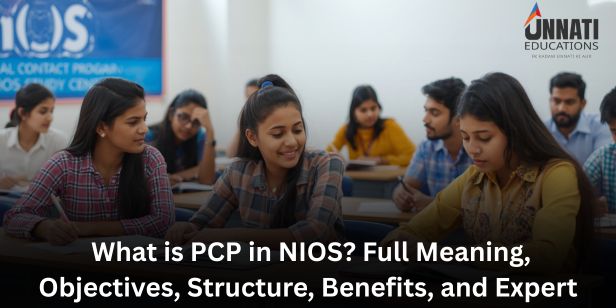Introduction: What is PCP in NIOS and Why It’s the Most Misunderstood Part of Open Schooling
You may have heard of PCP if you are a student of the National Institute of Open Schooling, India’s largest system of open learning. But, you might be wondering, What is PCP in NIOS, and am I required to attend?
What is the truth?
Open schooling doesn’t require daily classes or constant monitoring of your progress by teachers. This freedom can be liberating, but it also makes you feel a little lost. The Personal Contact Program (PCP) bridges this gap between self-study, structured guidance, and PCP.
Learn about the PCP and its features, duration, and importance.
PCP Full Form in NIOS
The PCP Full Form in NIOS stands for Personal Contact Program. This is a face-to-face academic support system that takes place at your Accredited Institute (AI), your official NIOS Study Centre. These sessions provide students with the classroom experience they lack when studying on their own.
During PCP, students get:
- Topic-wise lectures, clarifications, and explanations
- Guide for both practical and theoretical subjects
- Get help with your assignments and projects
- Motivation and mentorship
PCP make sure that distance learning does not mean distant understanding.
PCP Meaning in NIOS
You need to understand its purpose in order to fully grasp the PCP’s meaning of NIOS:
It’s an academic and emotional system that is designed to keep learners connected, confident, and capable.
While NIOS is based on self-study, PCP strengthens understanding, motivation, and consistency.
Interaction, discipline, and application of learning are more important than just attending class.
Short:
PCP = Personal Contact Program = Personalized learning through Human Connection
Key Objectives for PCP in NIOS
Each student enrolled at NIOS faces unique challenges. Some struggle with time, others with clarity, and some with motivation. All of these challenges are addressed by the Personal Contact Program.
PCP has three primary goals:
1. Clarify concepts
Teachers can simplify difficult topics by using examples, visuals, and real-life situations.
2. Facilitate direct student-teacher interaction
PCP is different from textbooks because it allows you to ask questions, share ideas, and get real-time feedback.
3. Encourage peer learning and collaboration
Students can meet other students with similar backgrounds and share study strategies. This boosts their confidence.
4. Get Practical Experience
The PCP program includes hands-on labs and lab sessions for science, geography, computer, or vocational subjects.
5. Students can receive academic and psychological support
Teachers help students overcome test anxiety and self-doubt. Self-study cannot do this.
6. Bridging the Gap between Self-Study & Formal Education
PCP provide open learners with the same quality of education and mentoring as regular school students.
Structure of PCP -- How It Works
Component | Details |
Duration | 30-35 days spread across 5-6 weekends (varies by subject). |
Mode | Some AIs provide hybrid support, which is primarily offline (face-to-face) at your study center. |
Sessions per Subject | Each subject costs 20 (15 theory + 5 practicals). |
Attendance Requirement | The theory portion is mandatory; the practical part is recommended. |
Study Centre (AI) | You will be directed to the NIOS Center, where you can attend classes and laboratories. |
You can also find out more about the Faculty. | Teachers appointed by NIOS who are qualified and have expertise in the subject they teach. |
Assessment Support | Included are discussions of assignments, lab evaluations, and TEE preparation. |
What happens during PCP sessions?
Students tend to think of PCP as boring lectures. Reality check: It’s much more interactive and valuable.
Interactive Classes
Teachers simplify complicated concepts using multimedia, real-life scenarios, and Q&A sessions.
Doubt-Clearing Segments
Students are given time to clarify questions, discuss concepts, and ask any questions they may have.
Practical Demonstrations
Physics, Biology, and Home Science are all subjects that include hands-on experiments, models, and real-world applications.
Help with Assignments and Projects
Facilitators will guide you on how to achieve high scores in the NIOS internal assessment.
Motivational talks & Counseling
Teachers and counselors can help students plan their study schedules and deal with procrastination. They also provide tips on how to stay prepared for exams.
Is the PCP in NIOS mandatory?
No, theoretical subjects do not require a technical component.
Here’s the truth: skipping PCP can be a mistake.
Attendance is mandatory for practical classes because:
- Participation in the lab is a requirement for obtaining practical marks.
- Certain practical exams cannot be taken without a PCP.
NIOS recommends a minimum of 50% attendance for theory subjects. However, the more sessions that you attend, the better the results.
The Top Benefits of Attending PCP at NIOS
You may save weekends by skipping PCP, but you will lose clarity, confidence, and marks.
How PCP can transform your NIOS experience
1. Clarity over Confusion
Experts can help explain concepts better than just studying study materials.
2. Improved Exam Preparation
Teachers will often share highly weighted topics, sample questions, and answer strategies.
3. Mentorship Access
Mentors can help you with your academic and career goals. This is a valuable resource.
4. Improved Practical Scores
You will perform better on lab exams and in projects if you have hands-on experience in PCP.
5. Higher Motivation
Studying in a group makes it less lonely and helps you to focus on your goals.
6. Confidence in communication
Discussions in groups improve listening, articulation, and analytical skills, which are vital for future jobs and education.
7. Accountability
Regular attendance is key to building consistency and routine, both of which are important traits for successful students.
PCP for Senior Secondary Learners vs Secondary Learners
Aspect | Secondary (Class 10) | Senior Secondary School (Class 12). |
The following are some of the most popular sessions | Each subject is worth 20 dollars | Each subject is worth 20 dollars |
Focus on Practical Applications | Limited | The Extensive |
Difficulty level | Moderate | The following are some of the most advanced ways to get ahead. |
Attendance Impact | You can also read about Recommended Products | Highly recommended / Mandatory |
Results | Foundation Building | Prepare for College/Competitive Exams |
Students in senior secondary school will benefit more from PCP, as it directly impacts their eligibility for higher education and preparation.
Attendance at PCPs: Rules and Etiquette
Remember these tips to make your PCP experience productive and smooth:
- Bring your NIOS ID and admission card to all sessions.
- Latecomers may not be marked as present.
- Take part in group and class work.
- Dress code and discipline are important to follow at your study center.
- All assignments and worksheets must be submitted during PCP.
- Keep track of your attendance, especially for practicals.
- Respect your teachers – many of them are also internal evaluators.
PCP develop real-world skills beyond academics
The PCP program is not just about grades; it also builds 21st-century skills.
- Critical Thinking is the process of analyzing, questioning, and applying concepts.
- Collaboration – Learning from others and working in teams.
- Communication – expressing ideas clearly.
- Adaptability is the ability to manage time and responsibilities efficiently.
- Confidence: presenting ideas and performing practicals.
Employers, universities, and the world at large reward these skills.
Real Life Experiences of NIOS Learners
I used to study on my own and didn’t think PCP was necessary. Attending it changed my life — I improved 22% on my exams and finally understood Economics.
— Ananya, NIOS Class 12, 2024 Batch
The practical sessions in PCP helped me pass Physics with 84 points. The teacher’s explanations are more helpful than any YouTube video.
Sahil Kumar is a Senior Secondary Science student.
“PCP provided me with a system of support.” I met classmates who motivated me to be consistent.
Ritika Jain Class 10, NIOS
These testimonials show that PCP is effective if it’s taken seriously.
Common Myths about PCP in NIOS
Myth | Reality |
The PCP is optional. I can therefore skip it. | It’s not optional, it’s the main tool for learning. |
PCP don’t affect marks. | This affects the practical eligibility of students, their internal marks, and understanding. |
PCP is boring | Engaging becomes interactive and motivating when you do. |
You can learn everything online. | Live discussions and guidance cannot be replaced by online videos. |
Expert Tips on How to Get the Most Out of PCP
- Prepare before you attend – Review the topic in advance.
- Do not hesitate to ask questions – even if you have a small doubt, do not hesitate to ask.
- Take notes – Teachers will often discuss topics that are covered in exams.
- Create a peer network to study together.
- Track Attendance, especially for practical topics.
- Use PCP to plan your exams – ask teachers for sample papers, key topics, and assignment tips.
Unnati Education: A Supporter of PCP learners
Unnati Education has guided thousands of NIOS Students through the admissions process, assignments, and exams. PCP is at the core of our learning strategies.
We can help you:
- Understanding the PCP schedule and structure is important.
- Before attending a session, prepare notes and assignments.
- Review the key topics in PCP to get maximum marks.
- Contact mentors to get subject-specific advice.
Our mission is to ensure that every NIOS student learns smartly, not hard.
Conclusion: Why you shouldn't ignore PCP in NIOS
Now you know exactly what is PCP in NIOS. It’s the Personal Contact Program. This unique system combines both the flexibility of online learning with the guidance provided by classroom teaching.
You will benefit from regular attendance at PCP.
- Understanding subjects faster and more deeply
- Mentorship can help you gain confidence.
- Practicals and Theory: Score higher
- Communication and problem-solving skills
It may seem like a good idea to skip PCP, but this is the equivalent of trying to swim without water.
If you are enrolled in NIOS, make PCP a priority and not an optional choice.
Open schooling success is not about studying alone. It’s about being connected, guided, and prepared.
FAQ's
What is PCP in NIOS?
Personal Contact Program is a series of face-to-face meetings where NIOS Students interact with Teachers, clear their doubts, and attend practicals.
What is the full form of PCP in NIOS
The full name is Personal Contact Program.
Is PCP mandatory in NIOS?
It is not mandatory, but it is required for the practical subjects. All learners are strongly encouraged to do so.
What is a PCP Hall Ticket?
This is the official document that confirms your schedule and enrollment in PCP classes.
Can I skip PCP classes?
It's possible, but it is a bad idea. You'll miss out on important guidance, practical marks, and clarity.
How will PCP affect my grades?
Active participation in class can improve scores on assignments and practicals.



